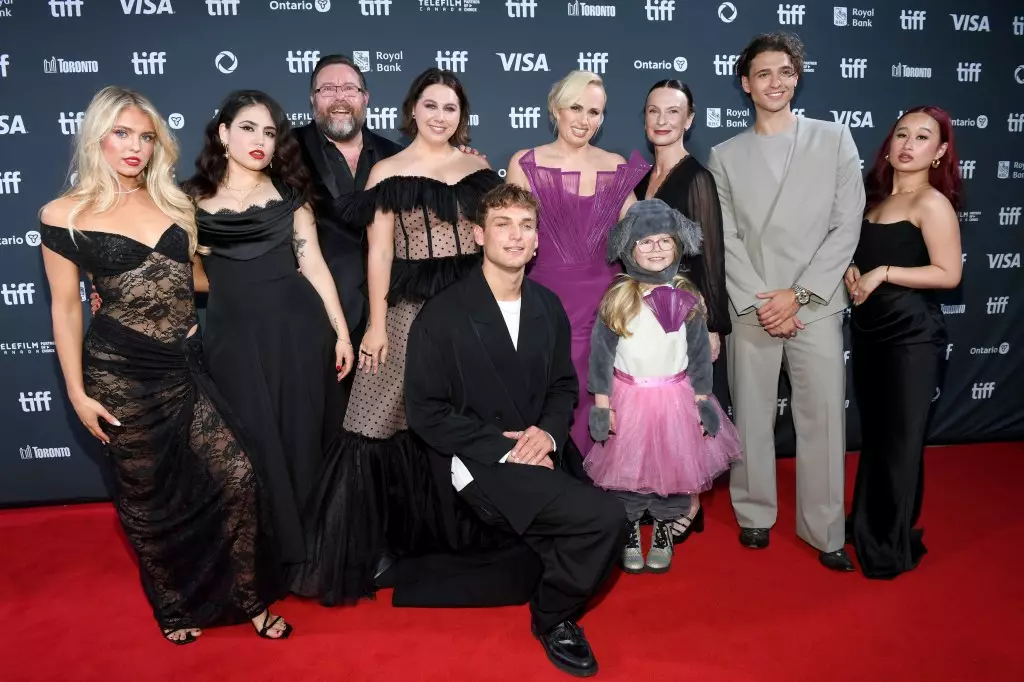Rebel Wilson has made headlines recently not only for her acclaimed work as an actress but also for becoming embroiled in a legal maelstrom following her film, *The Deb*. Wilson’s decision to launch a counter-lawsuit against the film’s producers is a striking move in what has been characterized as a tumultuous and controversial dispute. Tensions escalated after the film’s world premiere at the Toronto Film Festival, a moment that should have been celebratory but instead became the backdrop for public and legal battles.
As the situation stands, Wilson, alongside her attorney Bryan Freedman, accused the film’s producers—Amanda Ghost, Gregor Cameron, and Vince Holden—of engaging in foul play. This counter-complaint has brought to light a series of serious allegations, including claims of bullying and sexual misconduct. Notably, Wilson asserts that she stands not only for herself but also for others who have suffered in silence at the hands of the accused. This sentiment strikes a chord in a cultural moment where the brave testimonies of individuals confronting abuse have paved the way for broader conversations about power dynamics and accountability in the film industry.
In her 35-page legal filing, Wilson’s allegations illuminate a troubling landscape marked by what she refers to as the “absolute f*ckwits” of her co-producers. According to Wilson, their actions have not only harmed her but have also left a trail of suffering among others associated with the project. The “Amanda Ghost strategy” as depicted in the countersuit describes a systematic approach employed by the producers to silence dissenters through intimidation. This narrative of manipulation is indicative of a broader pattern seen in many creative industries, where the fear of retribution often stifles voices of dissent.
Moreover, the timing of Wilson’s counter-suit paints a picture of escalating hostilities. Following public outbursts and social media exchanges that criticized the producers for mishandling film funds and engaging in inappropriate conduct towards co-stars, the producers retaliated with a defamation lawsuit. The irony in this exchange is palpable; both parties are engaged in a contentious struggle for narrative control, wherein they are publicly battling over credibility and virtues.
The legal landscape surrounding *The Deb* has swiftly evolved from a celebration of cinema to a battlefield of accusations and counterclaims. Wilson’s legal team perceives the producers’ initial defamation lawsuit as an overt attempt to distort the narrative and pull attention away from their alleged misconduct. In response to this perceived manipulation, Freedman has highlighted the existence of numerous witnesses willing to testify about similar experiences encountered with Amanda Ghost. This adds a layer of complexity to the dispute, signalling that Wilson’s claims may have broader implications within the industry.
Freedman’s remarks about the producers’ strategies being “desperate” point towards the precarious positioning of the accused. The fallout extends beyond just Wilson; it threatens to expose a culture of silencing that allows abuse to persist unchallenged. This legal showdown may very well compel others in the industry to reevaluate their positions and potentially disclose their experiences, fostering an environment for change underpinned by accountability.
As the legal wrangling continues, the question arises: what does this mean for Wilson’s career and the ongoing conversations surrounding misconduct in Hollywood? The outcome of her counter-suit could serve as a litmus test for how similar disputes might be resolved in the future. As mentioned by Freedman, this battle appears to be just the beginning—a mere “tip of the iceberg.” The looming specter of more revelations could either bolster Wilson’s claims or twist the narrative further.
Ultimately, this legal confrontation serves as a microcosm of the broader cultural shifts taking place in the entertainment industry. As the tides of accountability rise, figures like Rebel Wilson may find themselves at the forefront of a movement. Whether ultimately vindicated or not, her actions emphasize a collective call for truth—a beacon for many who have been muted and marginalised. As the legal proceedings unfold, industry insiders and observers alike will be watching closely, not only to see the outcome of this specific case but to gauge its ripple effects across the broader landscape of film and media.


Leave a Reply